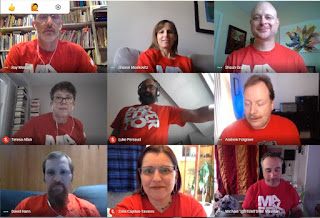Last Monday, I was contacted via direct message on Twitter by someone unfamiliar to me.
She wasn't a bot. She was real. She wanted to talk and I said yes.
We arranged to chat on Wednesday afternoon. It was a busy week, with the ETFO Summer Academy that Jennifer Brown and I facilitated (more on that next week) running Tuesday, Wednesday, Thursday and several errands and appointments involving my parents. I was tired and took a nap just before our conversation. Despite having voice fatigue, Marian and I talked for an hour and a half and it was delightful.
Marian is such a pleasure to talk to. She lives in New Mexico where she worked in school libraries for several years. She is not resting on her laurels now that she has retired. She is taking courses to help her decide and align her passions to her next adventure to which she'll devote her time and energy. Conducting these interviews is part of her process.
Marian asked me some very thought-provoking questions, such as
- What am I most proud of accomplishing in my career so far?
- What is one area of my practice I want to improve on, and how am I going about doing that?
- How do I continue developing professionally? What blogs or journals do I read regularly?
In our conversation, Marian and I laughed and cried. We chuckled at my students' tough evaluation of my organizational skills (which I had to confess was an area where I'd love to improve). I wept when I described how special library-related events can be the shining light in dark times for a student (which is part of an incident I told in an interview with Michelle Arbuckle). Our conversation helped me articulate the things that are important to me, aspects of my identity/personality and helped me remember some significant moments of my career. It gave me the chance to "amplify others" by promoting things like Doug Peterson's "This Week in Ontario Edublogs", OSLA's The Teaching Librarian magazine, Stephen Hurley's VoicEd Radio, Treasure Mountain Canada, maintained by Carol Koechlin and Anita Brooks-Kirkland, and Noa Daniel's "Personal Playlist Podcast" show.
Near the end of our chat, I asked Marian why she chose to reach out to me. She explained that she saw me on Twitter (we follow each other) and I looked like I might be an interesting person with which to converse. She peeked at my "digital footprint", saw I had been at AASL back in 2017 and decided to contact me. What a fluke! I have to say that coincidence plays a greater part in having cool opportunities thrown your way than you'd expect - for instance, I was hired to teach an AQ course because the provider wanted someone local to teach the course and someone saw my photo and home base on a subject association website - it had nothing to do with my credentials, awards, or reputation.
What would you do if a "stranger from the Internet" contacted you out of the blue? I was talking with my ETFO co-teaching partner Jenn about my experience with Marian when she shared a similar story. Jenn was participating in a Twitter chat and a fellow attendee contacted her via DM with a question. They talked on the phone and the interaction has turned into some professional conversations and personalized pedagogy projects.
So, I guess what I'm saying is, don't throw caution to the wind, but consider what is being asked (and by whom) and who knows? You may end up with something memorable.
So, I guess what I'm saying is, don't throw caution to the wind, but consider what is being asked (and by whom) and who knows? You may end up with something memorable.





